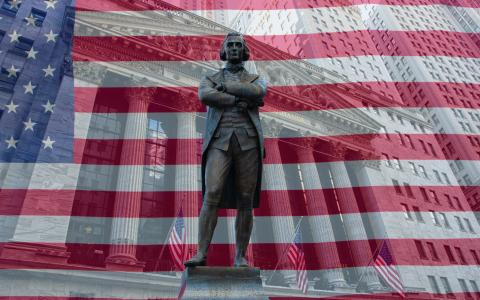
(Yahoo!Finance) - If politicians don’t listen to the CEOs and economists telling them to hurry up and resolve the debt-ceiling crisis, a more formidable master may intervene: the stock market.
Business leaders attending this year’s Milken Institute Global Conference in Beverly Hills, Calif., are as frustrated as anybody that Democrats and Republicans in Washington, D.C., are manufacturing an artificial crisis in which Congressional failure to raise the federal borrowing limit could force the U.S. government to default on its obligations.
The government hit the Congressionally-authorized borrowing limit in January. Since then, the Treasury Dept. has been shifting money among accounts to keep paying the nation’s bills. Treasury Secretary Janet Yellen said on May 1 that the Treasury is likely to run out of maneuvering room by early June, forcing it to prioritize payments, leaving some bills unpaid. All Congress needs to do is pass a new law raising the borrowing limit, but Republicans demand spending cuts as a condition of doing that, and Democrats say no way. Result: Impasse.
Before Yellen pegged the “X Date” at early June, many analysts thought it wouldn’t arrive until late summer. But federal tax revenue has been lighter than expected, speeding up the timeline. If debt-default D-Day really is barely a month away, markets may start to flinch, given that the consequences of a U.S. default, even a minor or technical one, could devastate markets.
“It could be markets that force lawmakers to do their jobs,” Maya MacGuineas, president of the Committee for a Responsible Federal Budget,” told Yahoo Finance at the Milken conference. “It shouldn't be, but I can't help but reminding people, 'Hey folks, do your job without making stock markets do it for you.'”
Every finance pro at the Milken conference knows there’s precedent for the stock market forcing Congress to act in an emergency. TARP. That was the Troubled Assets Relief Program, the huge bailout bill that helped stabilize the banking sector during the 2008 financial crash.
TARP failed to pass on its first vote, which took place just after Lehman Brothers failed and the government took control of mortgage giants Fannie Mae and Freddie Mac. Other Wall Street titans were tottering. The S&P 500 (^GSPC), already down 19% for the year, fell another 7% in one day. Congress got the message and four days later passed TARP after all. “Markets absolutely tanked and policymakers called everybody saying, 'What do we do?'” MacGuineas recalls. “That could happen here again.”
Most analysts think Congress will raise the debt limit one way or the other, with the main question being how much damage it could cause if it happens like TARP did, beyond the last second. “I don’t think the United States is going to default,” former Treasury Steven Mnuchin said at the Milken conference. “If the date was Sept. 1, people wouldn’t start negotiating till August. This will be solved.”
Republicans have passed a bill that raises the borrowing limit for about one year, in exchange for $4.5 trillion in spending cuts during the next decade. There's no chance Democrats who control the Senate will approve that bill, plus President Biden has said he'll veto it. Democrats want to raise the debt ceiling for two years or more and address spending cuts separately, which Republicans say would only delay needed action to reduce the federal debt. Biden is due to meet with House Speaker Kevin McCarthy to start negotiations on May 9, with with few breakthroughs expected until markets demand them.
By Rick Newman · Senior Columnist



